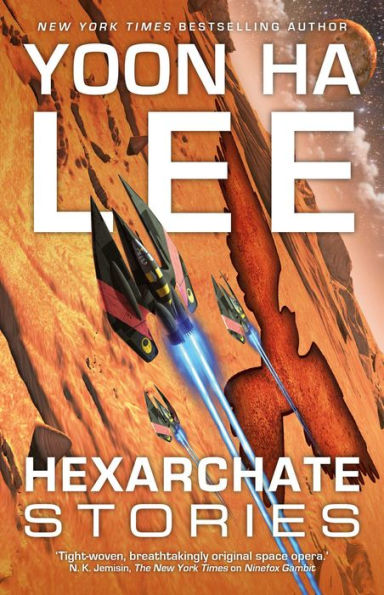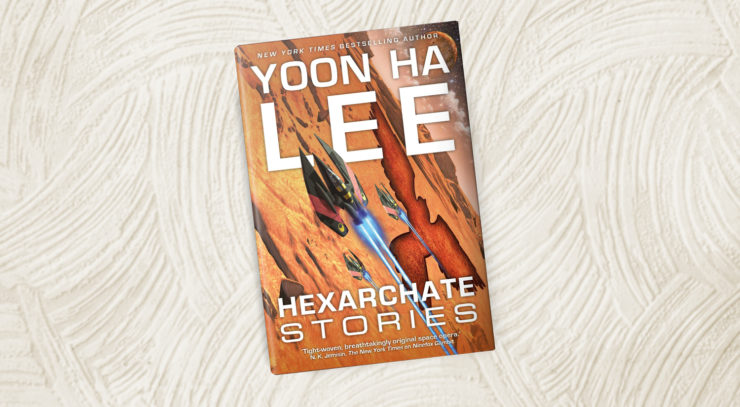The Machineries of Empire trilogy wrapped up last June—bringing to a close one of the most engaging, provocative high-concept sf series I’d read in some time. Yoon Ha Lee, however, has not finished with that sprawling universe at large. Hexarchate Stories brings together a set of stories that spans over four-hundred years of worldbuilding and a handful of regime changes, shifting in style and tone from intimate (sometimes sexy!) flash fiction to plot-rich, dramatic tales of intrigue and violence.
Three of the stories in the collection are previously unpublished, including the closing novella “Glass Cannon” (set after Revenant Gun, the third Machineries of Empire novel), while the earliest reprinted piece is from 2012. The scope of initial publications ranges from magazines like Clarkesworld to Lee’s blog, and as such, the length and style of the stories also varies significantly throughout. That level of variation makes for a fast, entertaining reading experience, particularly for a collection of short fiction where all the stories share the same background.
Hexarchate Stories is truly a treat—a mix of bonus content, for lack of a better phrase, and gripping full-length short fiction set in Lee’s titular universe. The majority of the pieces collected here center around Shuos Jedao, though some are set as far back in the universe’s timeline as before the start of the heptarch calendar. The same energetic, relentlessly queer, unapologetically complex approach that defined the novels in the series is present in these stories as well: gender and sexuality exist on a wide spectrum, as does sentience, as do ethical interactions (or lack thereof) in the face of hideous power structures.
If you’ve been around long enough to catch a sense of the fiction I’m most fond of, it won’t come as a surprise that Shuos Jedao and his messy life are immensely engaging for me. Lee hits a great number of the immediate shortcut buttons to my enjoyment and Hexarchate Stories plays into that hand spectacularly well. As it will, I suspect, for any reader familiar with the series and eager to see just a bit more, a bit more, and so forth. While I’m not sure that the collection would be a starting place for a reader who hasn’t read the trilogy, given that a great deal of the flash fiction or shorter pieces from Lee’s blog have no context outside of familiarity, it’s possible someone unfamiliar would be able to latch on to the longer-form pieces. Lee’s prose is, after all, eminently accessible—at turns playful and sharp, consistent in its powerful imagery and occasional horror.
The original stories can stand on their own, though familiarity adds to them. It’s also worth noting that all three are quite different pieces, all doing different work. “Gloves” was, as Lee comments in the after-notes, a hot exercise in blowing off steam; I’ll verify, it’s certainly that, with just enough unsettling hints at the larger arc of the narrative universe to give it some tension. “Silence” takes a first person approach to a sibling interaction with the older brother observing something unwell, something unsettled, about the younger… and letting it go, with the haunting closing note that he will eventually realize his mistake. The strongest and longest of the fresh pieces is both the final story in the collection and set at the current end of the Hexarchate timeline: “Glass Cannon.” The edge-of-the-seat tension of Jedao and Cheris’s mission to reunite him with his memories, full of emotionally brutal reflection and self-destruction, was top notch work. And while the individual struggles remains devastatingly intense, the larger scope of the world’s oncoming conflicts—the moths, the servitors, questions of sentience and factionality—is a nail-chewing spot for Lee to drop the curtain. Bravo, for that.
Buy the Book


Hexarchate Stories
The author’s notes are one of the other bits of almost-bonus content I quite appreciated. Lee is frank and conversational about the process of writing each story, some for commission and some for pleasure and some because they fit into important gaps in the series. It adds a burst of vibrant personality and closeness, as if we’re interacting with the author on a fandom level about the work, which is just fun. I got a good laugh out of comments such as, “For someone who likes to think of himself as being very smart, Jedao is terrible at a lot of things […] or maybe it’s just that I think it’s hilarious to write the archetypal high-Intelligence, low-Wisdom character. I’m pretty convinced that Wisdom was Jedao’s dump stat.” Lee is able to bring his characters and process to life for the reader simultaneously in the notes; as a writer and a reader, I dig that.
There are also the reprinted stories, as well. One of the best is “Extracurricular Activities,” originally published here at Tor.com. It holds up well as a piece featuring significant spacefaring intrigue—and despite Lee’s note that it was “screamingly difficult” to write, it’s gripping, fast-paced, and entirely readable as a standalone story. The flash pieces and blog reprints are the ones that rely on outside context, as they’re rarely standalone pieces and exist more as little bonus vignettes into the lives of characters—such as “Sword-Shopping,” featuring a young Cheris, or “Persimmons,” about servitor 135799 coming to the Kel academy. Those pieces are candy: chewy and sweet for the reader who wants those extra bites of content, detail, background that fit nowhere else.
Lee’s sweepingly broad universe is full of moral quandaries, queer folks pursuing a hundred different sorts of life, and big questions about sentience, ethics, self-determination; these shorter stories naturally are, too. Hexarchate Stories isn’t an entry-point for a reader who’d like to start the series—but it is a reward for those of us who’ve already been around. That’s a specific sort of project and Lee succeeds at balancing the demands of original, compelling short stories with the treat of fan-oriented glimpses behind the curtain (both for the characters and the narrative). The resultant collection feels like a present wrapped up neat with a note for the constant reader to enjoy.
Hexarchate Stories is available from Solaris.
Lee Mandelo is a writer, critic, and editor whose primary fields of interest are speculative fiction and queer literature, especially when the two coincide. They have two books out, Beyond Binary: Genderqueer and Sexually Fluid Speculative Fiction and We Wuz Pushed: On Joanna Russ and Radical Truth-telling, and in the past have edited for publications like Strange Horizons Magazine. Other work has been featured in magazines such as Stone Telling, Clarkesworld, Apex, and Ideomancer.










